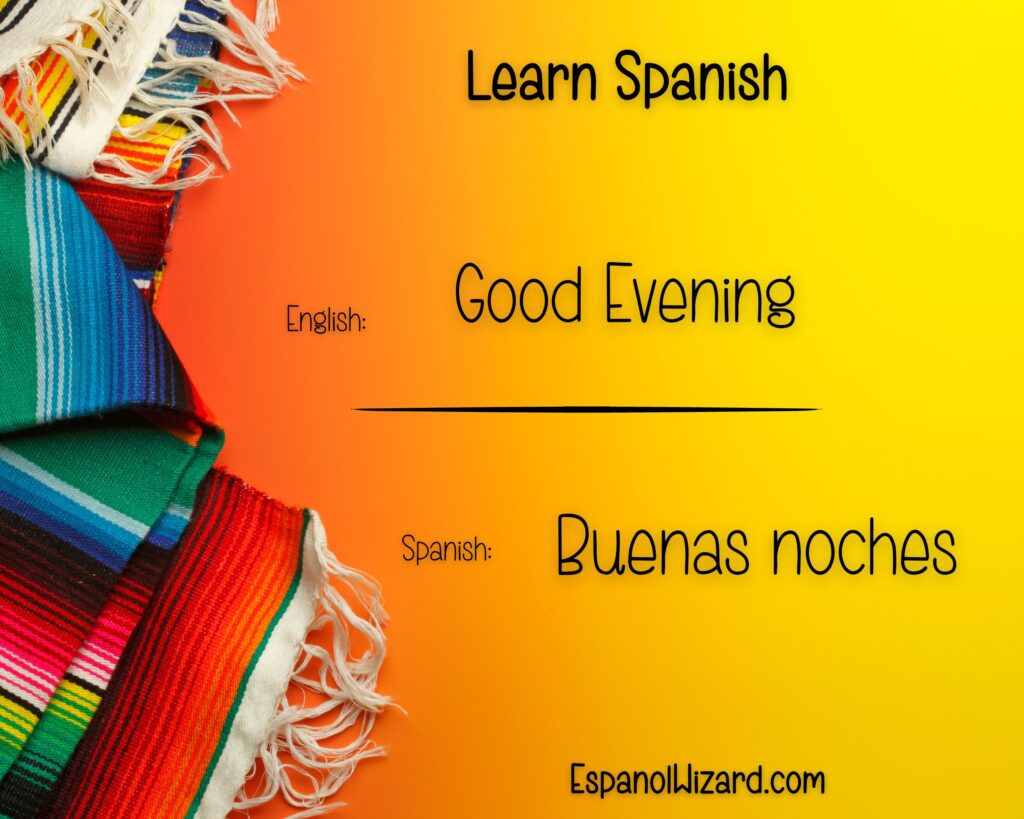“Buenas Noches” is a warm and friendly Spanish term that carries the essence of wishing someone a good night. If you’re curious about its pronunciation, usage, and more, you’re in for a delightful exploration. Let’s dive into the world of “Buenas Noches.”

Pronunciation:
Phonetic Pronunciation: /bweh-nahs noh-ches/
Here’s a breakdown of the pronunciation:
- “bweh”: Similar to the English “b” sound, followed by “weh” like the first syllable in “wedding.”
- “nahs”: Pronounced like “nahs,” rhyming with “hass.”
- “noh-ches”: Sounds like “noh” and “ches” separately.
Combine the parts smoothly: “bweh-NAHS noh-CHES.”
Remember, the emphasis is on the first syllable: “BWEH.”
Meaning and Usage:
“Buenas Noches” literally translates to “Good Nights” in English. It is used to bid someone a good night or to express well wishes as the day comes to an end. It’s a versatile phrase that can be used in various situations:
- Greetings: You can use “Buenas Noches” to greet someone as they prepare to retire for the night. It’s a courteous and thoughtful way to wish them a peaceful night’s sleep.
- Departure: When leaving a social gathering or an event in the evening, you can use this phrase to bid farewell and express your hope that the person has a restful night.
- Text Messages and Notes: “Buenas Noches” is a popular phrase to include in text messages, emails, or notes to friends and loved ones. It’s a simple yet heartfelt way to convey your care and affection.
Cultural Context:
In many Spanish-speaking cultures, the concept of greeting and bidding farewell is taken seriously. “Buenas Noches” is a reflection of this cultural value, as it signifies your consideration for the well-being of the person you’re addressing.
Comprendiendo “Buenas Noches”: Uso, Pronunciación y Más
“Buenas Noches” es un término cálido y amigable en español que encierra el deseo de desearle a alguien una buena noche. Si tienes curiosidad sobre su pronunciación, uso y más detalles, estás a punto de disfrutar de una exploración encantadora. Adentrémonos en el mundo de “Buenas Noches.”
Pronunciación:
Pronunciación fonética: /bweh-nahs noh-ches/
Aquí tienes una desglose de la pronunciación:
- “bweh”: Similar al sonido “b” en inglés, seguido de “weh” como la primera sílaba en “wedding” (boda).
- “nahs”: Pronunciado como “nahs,” rimando con “hass.”
- “noh-ches”: Suena como “noh” y “ches” por separado.
Combina las partes suavemente: “bweh-NAHS noh-CHES.”
Recuerda, el énfasis está en la primera sílaba: “BWEH.”
Significado y Uso:
“Buenas Noches” es una traducción literal de “Good Nights” en inglés. Se utiliza para desearle a alguien una buena noche o para expresar buenos deseos mientras el día llega a su fin. Es una frase versátil que puede usarse en diversas situaciones:
- Saludos: Puedes usar “Buenas Noches” para saludar a alguien mientras se prepara para descansar por la noche. Es una manera cortés y considerada de desearle un sueño tranquilo.
- Despedida: Al dejar una reunión social o un evento por la noche, puedes utilizar esta frase para despedirte y expresar tu esperanza de que la persona tenga una noche de descanso.
- Mensajes de Texto y Notas: “Buenas Noches” es una frase popular para incluir en mensajes de texto, correos electrónicos o notas a amigos y seres queridos. Es una manera sencilla pero sincera de transmitir tu cariño y afecto.
Contexto Cultural:
En muchas culturas de habla hispana, el concepto de saludar y despedirse se toma en serio. “Buenas Noches” es un reflejo de este valor cultural, ya que simboliza tu consideración por el bienestar de la persona a la que te diriges.
As an Amazon Associate we earn from qualifying purchases through some links in our articles.
